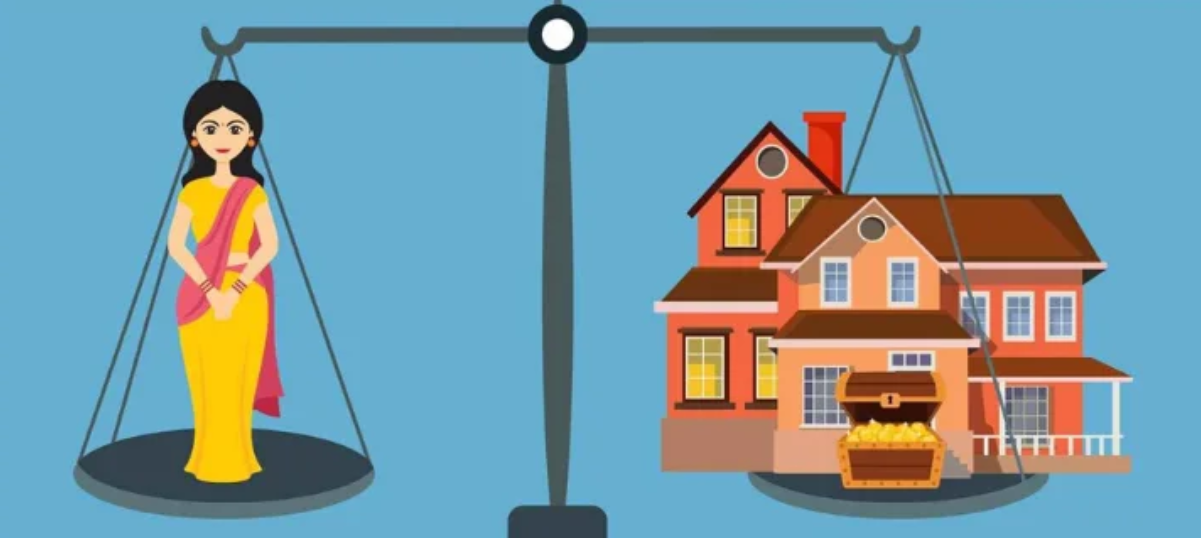Property Rights of a Wife After Divorce in India: Hindu vs Muslim Law
This post gives an overview about the property rights of a wife after divorce in India.
For couples in India, few things are more pressing after the end of a marriage than is divvying up property. The rules for this aren’t the same for everyone — they depend on what your religion is. Hindu and Muslim laws have entirely different methods of property division in the event of divorce. Whether you’re facing separation or simply want to know your rights, the following guide will help you understand what you are entitled to under Indian law.
What Happens to Property When Marriages End?
When it comes to divorce, it’s never easy – adding property division makes matters even more difficult. In India, family matters are governed by personal laws, so Hindus, Muslims, Christians and Parsis must follow separate rules. This article addresses the two biggest religious communities — Hindus and Muslims ― and how their laws deal with property rights following divorce.
The biggest difference? Hindu law grants the courts more latitude to divide property; Muslim law is based on strict religious principles regarding who owns what. Let’s dissect the two systems so you know exactly where you stand.
For expert legal guidance on family law matters, visit Zista Legalis.
Hindu Law: Here Is How Property Gets Divided After Divorce
Laws That Apply to Hindus
Divorce cases among Hindus are governed by the Hindu Marriage Act 1955. This applies to Hindus, Buddhists, Jains and Sikhs. For property, courts also refer to the Hindu Succession Act, 1956 and Hindu Adoption and Maintenance Act, 1956.
There is no automatic 50-50 division of property under Hindu law, for example, as there might be in some Western countries. Instead, courts assess each case one by one and rule on what’s fair.
Can Hindu Women Claim Husband’s Property?
And here’s a big one: wives are not automatically guaranteed half or even a significant portion of their husband’s property simply because they were married. The Hindu law does not acknowledge joint ownership unless both names are mentioned in the property documents.
But courts can grant what’s known as maintenance or alimony—ongoing payments to the wife by way of support after divorce. In certain special cases, the court may direct husbands to pay a lump sum amount or even transfer property to the wife as part of the settlement.
And the Wife’s Separate Property?
Whatever property the Hindu woman owns in her own name is retained by her. This includes:
- Real estate she had paid for with her own money
- Gifts received during marriage
- Inheritance from either or both of her parents or nearest of kin
- Property purchased in her name (regardless whether the husband paid for it)
The husband has no automatic entitlement to the share of any of this property on divorce.
Stridhan: Special Rights for Women
Property rights of women have been categorized in a separate class known as ‘Stridhan.’
Stridhan is really a peculiar concept of Hindu law. It refers to “women’s wealth” and comprises:
- Jewelry and presents bride gets at the time of wedding
- Gifts from parents, relatives and friends
- All gifts prior to, on or after marriage
- Property given by in-laws
Stridhan is the absolute property of wife. The husband can’t take it, sell it or lay claim to a portion of it — ever during the marriage. After divorce all stridhan is returned to the wife. When the husband, or his family, refuses to return the ‘streedhan’ then the wife may lodge a criminal complaint under Section 406 of Indian Penal Code.
If You Bought Property Together: Rules of Joint Ownership
If a couple purchases property together (both names are on the paperwork), the property becomes considered joint property. Each has an ownership interest that belongs to them after divorce. The court generally directs the property to be sold with the money divided in proportion of each person’s contribution.
They might get a larger share if one paid in more money. The court reviews bank statements, pay receipts and other evidence to determine what’s fair.
Maintenance and Alimony under Hindu Divorce
Husbands can be court ordered to:
- Temporary Maintenance: Temporary support during the pendency of the divorce
- Permanent Alimony: One time payment or recurring payment after divorce
- Child Support: Payment for the expenses of the children
The amount depends on:
- The husband’s income and assets
- Financial position and earning capacity of the wife
- The lifestyle during marriage
- The length of the marriage
- If the wife has any children to support
In such prominent decisions the courts have granted 25-30% of husband’s net worth as alimony for life even if the wife doesn’t have any other source of income.
How Courts Decide Property Matters
For couples who can’t agree, courts weigh:
- Who paid for the property
- Whose name is on the property papers
- The wife’s indirect contributions (raising children, housework)
- If the wife sacrificed her career for the family
- Financial needs of both parties
Recent judgments have reflected an understanding that homemakers contribute significantly to creating family wealth, even if they are not paid in cash.
Muslim Law: Property Rights In Accordance With Islamic Law
Which Laws Apply to Muslims?
Muslim divorces in India are governed by The Muslim Personal Law (Shariat) Application Act 1937 and the Dissolution of Muslim Marriages Act 1939. The laws are rooted in Islamic religious texts and centuries-old traditions.
Unlike Hindu law, Muslim law is also quite prescriptive about property and courts have to follow something in the nature of precise rules.
Three Kinds of Divorce Under Muslim Law
When it comes to property rights, you need to understand the types of divorce:
- Talaq: This is when the husband wants to divorce (standard method)
- Khula: Wife is the one seeking divorce, she usually returns her Mehr
- Mubarat: Where both parties decide to separate by mutual consent
The kind of divorce matters when it comes to what financial rights the wife has after.
Mehr: The Most Important Payment
Mehr (or also Mahr) – a financial endowment made by the groom to the bride. It is settled at the time of marriage (nikah) and becomes the absolute right of the wife. Consider it the husband’s investment in his wife’s financial security.
Mehr can be:
- Cash money
- Gold or jewelry
- Property or land
- Any valuable item
There are two types:
- Prompt Mehr: Immediately payable on demand (it can be before or during the marriage)
- Deferred Mehr: Due on end of marriage (on divorce or the death of the husband)
After divorce, the ex-wife is legally entitled to receive her Mehr. If the husband refuses to pay, she can bring a case to court. Mehr is mentioned in the nikahnama (marriage contract) and enforced strictly.
For more information on Muslim marriage and divorce laws in India, you can refer to this comprehensive guide on Indian family law.
Do Muslim Women Have Right to Claim Husband’s Property?
The answer is STRICTLY NO. Muslim law is very clear: a divorced wife has no right over her husband’s property. There is no such thing as property division or sharing the husband’s assets after divorce.
The only economic rights of the wife are:
- Her Mehr amount
- Maintenance during iddat (Period of waiting after divorce)
- Restoration of any property she brought to the marriage
Maintenance Rights for Muslim Women
In line with traditional Muslim law, wives get only maintenance for iddat — about 3 months after divorce. But that changed courtesy of a precedent-setting case.
The Shah Bano Case: A Turning Point
In 1985, the Indian Supreme Court held that Muslim women could be entitled to claim maintenance under Section 125 of the Criminal Procedure Code (CrPC) which is applicable to all Indians irrespective of their religion. This caused major controversy.
Muslim Women (Protection of Rights on Divorce) Act 1986
Parliament enacted this special law for Muslim women after the Shah Bano case. According to this act, Muslim women who have been divorced can claim:
- Maintenance during iddat period
- Mehr amount
- All assets handed over to her prior, during or after marrying
- Maintenance for children
If the husband is unwilling or not financially able, then maintenance can be claimed from:
- Her next of kin who will inherit from her
- The Wakf Board (Islamic trust)
Recent Supreme Court Ruling (2024)
In a judgment passed recently, the Supreme Court held that Muslim women CAN claim maintenance under Section 125 CrPC after the iddat period provided they’re unable to sustain themselves. This provides Muslim women more protection than they had under classical Islamic law.
Wife’s Property in Muslim Law
All of the property that a Muslim woman has is her own, always and entirely:
- Property inherited from her parents
- Property she buys with her own cash
- Gifts and jewelry
- Business assets
The husband does not have any right over her property and she retains the ownership of all her assets after divorce.
Need legal assistance with your divorce case? Contact Zista Legalis for professional guidance.
Hindu and Muslim Rights to Property Compared
| Aspect | Hindu Law | Muslim Law |
|---|---|---|
| Claim over husband’s property | No automatic right, but courts can order share depending on facts | None at all |
| Maintenance | Can be lifelong or until remarriage | Initially only during iddat; Section 125 CrPC extends it |
| Property division | Courts decide based on fairness and contribution | No concept of division; kept separate |
| Special payments | Alimony (by court) | Mehr (decided at time of marriage) |
| Joint property | Divided as per contribution | Rare; mostly stay separate |
| Wife’s personal property | Completely protected, including stridhan | Fully protected |
| Court’s power | Broad discretion for doing justice | Limited scope being bound by religious rules |
| Children | Both parents equally responsible | Father primarily responsible |
What Property Is Off Limits After Divorce?
These are, whether one is a religious person or not:
Ancestral Property
In Hindu personal laws, ancestral property (property inherited from father, father’s father or paternal great-grandfather) is distinct from self-acquired property. Wife cannot claim the property of her husband if it is ancestral after divorce. On the other hand, if she has sons they get coparcenary interest in ancestral property.
Property in Others’ Names
Neither spouse can claim property in someone else’s name (including that of his or her in-laws) during the divorce process.
Property Owned Before Marriage
Their claim to anything they brought into a marriage also tends not to change; property one person had before the marriage is owned only by that person, unless that individual did something to transfer it over.
Recent Changes in Indian Law on Property
Hindu Succession Act Amendment (2005)
This major reform bestowed equal rights in ancestral property on Hindu daughters as was the case with sons. Even after marriage, post Hindu Succession Amendment Act, a Hindu woman will keep and have share in her parents’ ancestral property. After divorce, that becomes all the more important as her safety net.
New Muslim Marriage Bills (Proposed)
A few reforms being considered in the states are as follows:
- Mandatory registration of marriages
- Clearer guidelines on maintenance
- Strengthening of women’s property rights
These are still being debated as of 2025.
Supreme Court Guidelines
Recent court judgments have emphasized:
- Recognizing homemakers’ non-monetary contributions
- Preventing divorced women from becoming penniless
- Considering the marital standard of living
- Protecting children’s interests above all
Simple Strategies for Preserving Property Rights
For Women Going Through Divorce
- Do not lose any documents: Marriage certificate, property papers, bank statements
- Prepare an inventory: List what you brought to the marriage
- Open a separate bank account: If you don’t have one already
- Gather your evidence of contributions: Proof that you put money into joint purchases
- Don’t sign anything without legal counsel: Property settlements are final
- If in-laws are unwilling to return stridhan or jewelry: Lodge police complaint
For Men Facing Divorce
- Keep financial records clear: Prove what you paid for
- Know your maintenance responsibilities: Budget for future payments
- Don’t conceal assets: Courts may be harsh if they believe you have not been honest with them
- Fulfill Mehr commitment: (For Muslims) Save yourself from criminal cases – Pay on time
- Empathize and compromise: Fair settlements stop years of court battles
For Both Partners
- Start with mediation: A courtroom battle is pricey and bad for the soul
- Consider the kids: Prioritize their interests when making property decisions
- Hire your own attorneys: Each of you should obtain individual legal counsel
- Separate emotions from money: Decisions should be based on practicalities, not revenge
- Get it in writing: Verbal agreements cannot be enforced by law
When Do You Need a Lawyer?
You need legal help if:
- Property value is greater than ₹10 lakhs
- You have children
- Your spouse is hiding assets
- There’s domestic violence involved
- You’re unsure about your rights
- Settlement negotiations are going nowhere
- In-laws are interfering with property
- You have to apply for maintenance
A strong family lawyer can help you make your way through the legal labyrinth and work to secure you with what is fair.
Final Comment: Your Rights, and Your Future
Property division after a divorce in India is complex as rules vary according to religion. Hindu law confers upon courts the discretion of equity, Muslim law is a matter of strict religious observance with minimal judicial influence.
The Key Takeaways:
- Hindu women are not automatically entitled to half of the property, but can claim maintenance and in some cases a portion of the couple’s property
- Muslim wives receive Mehr, and can now claim permanent maintenance under CrPC, but have no legal right over husband’s property
- Personal property, gifts and inheritances are retained by all women
- The welfare of the children is what it should be in every case
- Document everything – keep the records of everything
As a Hindu or Muslim, knowing your legal rights is the initial step to safeguard yourself in divorce. Laws are gradually changing so that women have more protection, but you need to understand what your rights are and be willing to fight.
Keep in mind that each divorce case is different. While this article gives you a good jumping-off point, be sure to contact an experienced family lawyer who can give you personalized advice based on your situation. Your financial future will be determined by what you do now.
For expert legal consultation, visit Zista Legalis today.
Frequently Asked Questions
Q1: Can a Hindu wife demand 50% of her husband’s property after divorce?
No, there is no across the board 50-50 rule in India. Courts can award maintenance or alimony, and occasionally order a spouse to transfer property, but the wife isn’t entitled to half of everything. Every case is decided on its particular facts.
Q2: What if my husband does not pay Mehr after divorce?
You can challenge it legally by filing a case in family court to get your Mehr. As Mehr is specifically mentioned in the nikahnama (marriage contract), it is legally enforceable. The court can compel the husband to pay, and failure to do so can result in punishment.
Q3: Is an employed woman entitled to maintenance as much as a non-employed woman does?
Not necessarily. Even women employed outside the home may receive maintenance if their income is substantially lower than their husband’s or if they sacrificed career opportunities for the family. The courts take into consideration the standard of living throughout the marriage and the disparity in spouses’ financial circumstances.
Q4: Can I claim property in my in-laws’ name?
No. You cannot take something that is not your spouse’s legally or joint property. The property owned by your in-laws is not included in the divorce settlement.
Q5: What if my husband gifted me jewelry in the past and now wants it back?
Jewelry given to you during the wedding ceremony, and during marriage in the case of Hindus, is your stridhan under Hindu law or personal property according to Muslim law. Your husband has no legal right to take it away from you. You can file a police report if he attempts to withhold it.
Q6: What is the time to resolve property disputes in divorce cases?
It ranges widely–from 1-2 years if everyone is amenable to 5-10 years in case things get ugly. Mediation and consensual settlement is much quicker than spending hours in court.
Q7: May I demand my part of increased income of my husband or business growth in future?
Maintenance can be determined on the basis of current income, but you aren’t entitled to a cut of that increase in business growth or revenue post-divorce. A court can, however, review maintenance amounts at regular intervals if circumstances have changed materially.
Q8: What rights do minor children have with respect to the property following divorce of parents?
When divorce occurs, a child’s right to inherit from parents still stands. Sons and daughters continue to be able to inherit from both parents. But, when it comes to custody and residence, the two are regarded as separate matters determined in court of law based on what is best for children.
Q9: Can Muslim Women Seek Maintenance under Section 125 CrPC?
Yes. Notwithstanding the Muslim Women (Protection of Rights on Divorce) Act, recent Supreme Court judgments have held that a Muslim woman is entitled to maintenance under Section 125 CrPC applicable to all Indian citizens, irrespective of their religion especially if she has no means after the iddat period.
Q10: What if my spouse is not being honest about property or assets?
Inform your lawyer immediately. You can ask the court to order disclosure of assets. Hiding money or assets is treated very seriously – Judges will often penalize the non-disclosing party with the fees and costs of fighting to uncover hidden assets and could award higher settlements for the upfront (victimized) spouse.
For more information and personalized legal advice, visit Zista Legalis.





